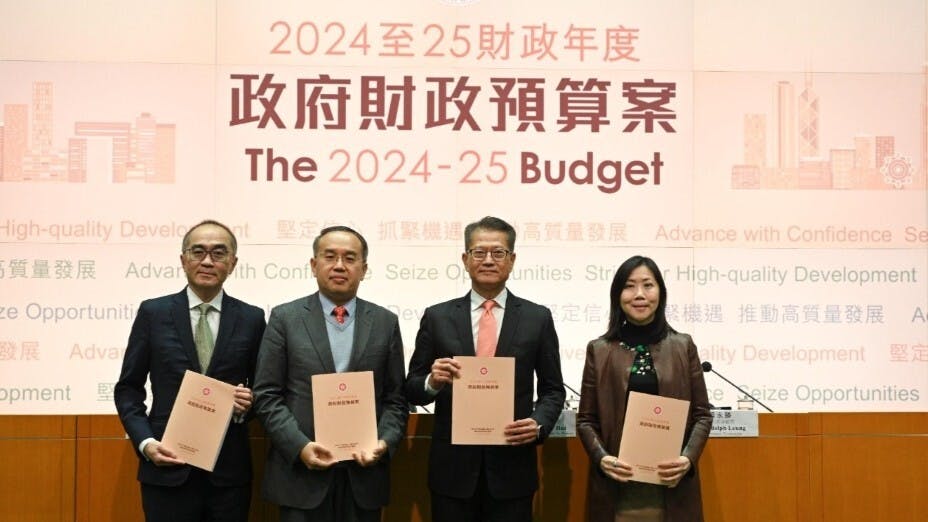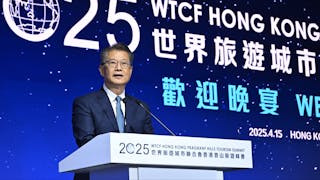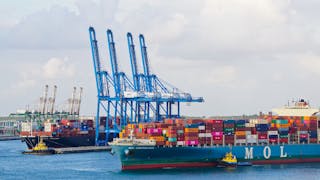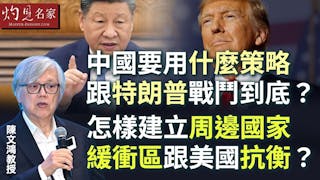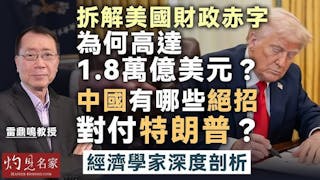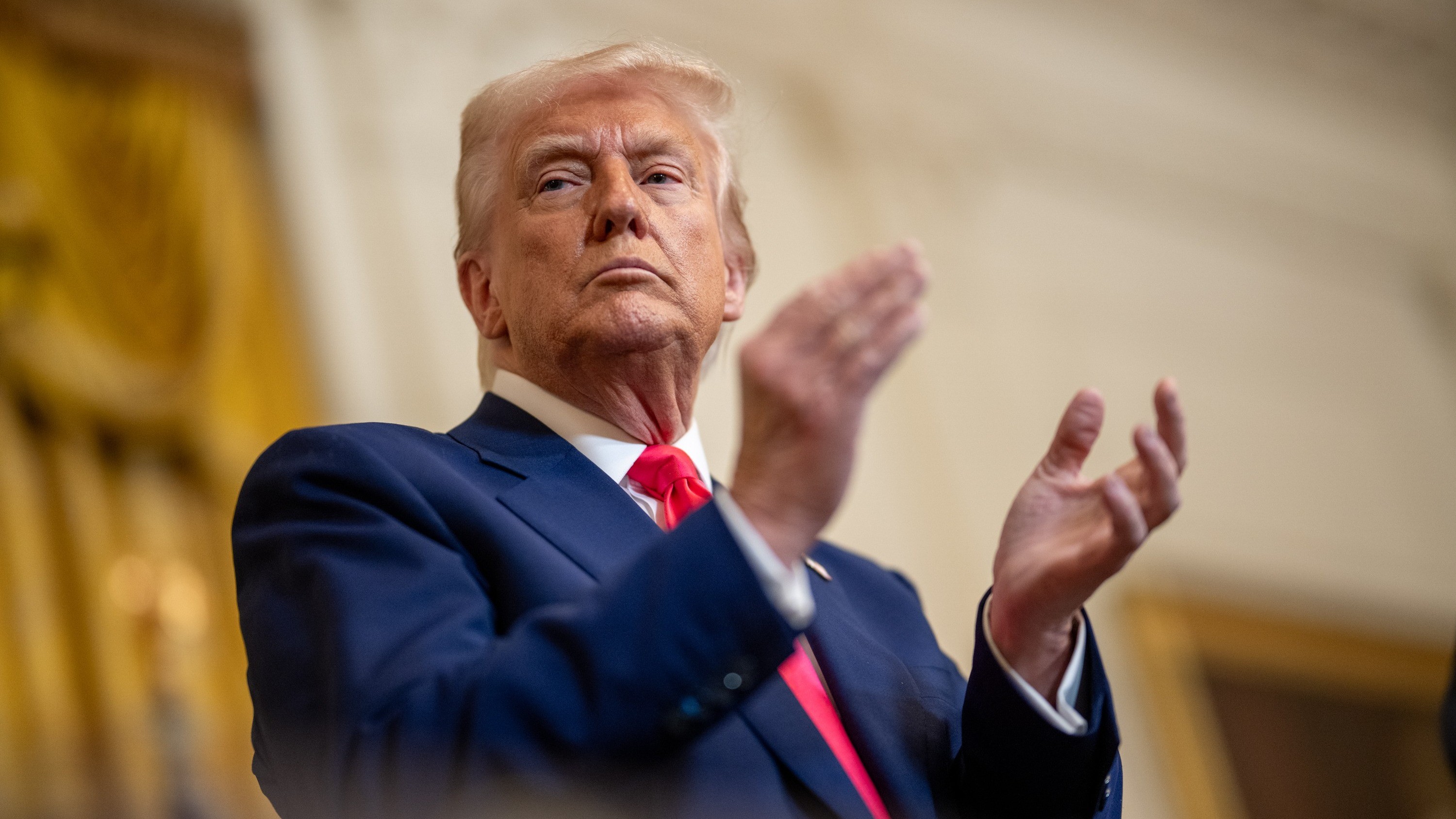香港特區政府財政司司長陳茂波發表的《財政預算案》演辭顯示,特區政府在處理2024年至2025年的《財政預算案》時,仍保持漸進式改革的風格。最重要的是,預算案在港澳辦主任夏寶龍訪問香港考察調研最後一天(2月28日)發表。這兩件事放在一起來看,《財政預算案》對香港特別行政區來說,有着巨大的政治意義。
用者自付原則 調整稅費項目
預算案的全部主旨是控制政府支出,並透過其他方式增加政府收入,特別是按照「用者自付」的原則調整收費和稅目。2024至2025年,政府總收入為6330億港元,政府總支出為7769億港元。2024-2025年預計綜合赤字為481億港元;截至2025年3月底,財政儲備預計為6851億港元。2025-2026年至2028-2029年預計可達綜合盈餘,財政儲備財政儲備在2029年3月底預計為8322億港元。
2024-2025年預計綜合赤字為481億港元。到2025年3月底,財政儲備預計為6851億港元。2025-2026年至2028-2029年,預計會出現綜合盈餘,到2029年3月底,財政儲備預計為8322億港元。
香港政府的財政預算遵循三個原則:一、逐步實現財政平衡,將財政儲備維持在審慎水平;二、以削減支出為重點,務實增加部分收入;三、有效分配資源及改善公共服務,照顧市民的需要。
在控制政府開支方面,公務員編制維持零成長。2026至2027年政府經常開支削減1%。長者及合資格殘疾人士公共交通票價優惠計劃(即2元優惠計劃)及公共交通票價補貼計劃的運作將會檢討,但政府無意取消這些計劃。
基建工程項目均採取成本效益原則。將根據優先順序和緊急程度進行調整。北部都會區基建等已規劃成熟的項目正按計劃推進。然而,目前處於初步規劃階段的基建項目,實施進度將有所調整。
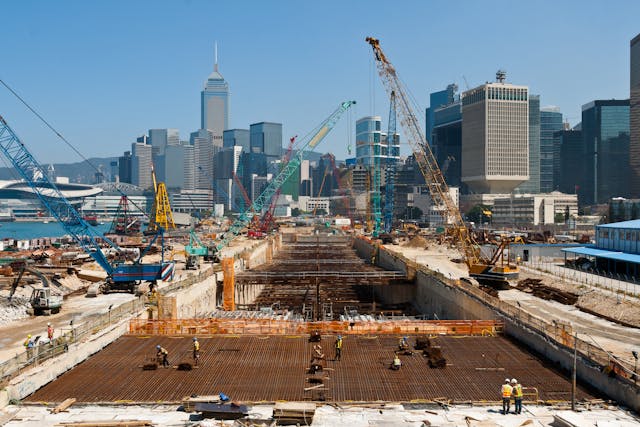
薪俸稅和個人入息稅 標準稅率改兩級制
最重要的是,政府提出薪俸稅和個人入息課稅的標準稅率兩級制,只影響淨入息超過500萬港元並按標準稅率計算應繳稅款的納稅人。採用累進稅率的納稅人不會受到影響。
標準稅率兩級制意味着淨收入超過500萬港元的人士將需要繳納16%的稅率──這是一個非常溫和的增幅。對於淨收入500萬港元或以下的人士,稅率維持在15%。顯然,稅率雖稍微增加但非常溫和。
自2025年1月1日起,酒店房租稅率將為3%。此外,政府對住宅物業引入累進評級制度,僅影響應課差餉租值超過55萬港元的住宅物業。每年應課差餉租值在55萬港元或以下的住宅物業,5%的差餉維持不變,涵蓋98%的私人住宅單位。就每年應課差餉租值55萬至80萬港元來說,超出的25萬元差餉租值將按8%徵收,影響約1.1%的私人住宅單位;超出80萬元的差餉租值的部分將按12%徵收,影響私人住宅單位的0.8%。整體而言,應課差餉租值百分比的調整,按本地住宅物業每年應課差餉租值遞增,採取輕微累進的制度。
政府在努力透過新措施增加收入的同時,也立即宣布取消特別印花稅、買家印花稅和新住宅從價印花稅,以維持大眾對房地產市場的信心。此舉也向那些游說政府取消所有「辣招」的團體作出讓步,以令樓市能夠繼續保持繁榮。
短期來看,各項印花稅的取消可能會對樓市產生刺激作用,包括內地購房者在內的買家可能會受到刺激而入市;然而,一些觀察家預測,新措施可能難以推動樓市持續回春,甚至繼續下跌,特別是全球和區域經濟遠不如有既得利益的人士預測那麼樂觀。
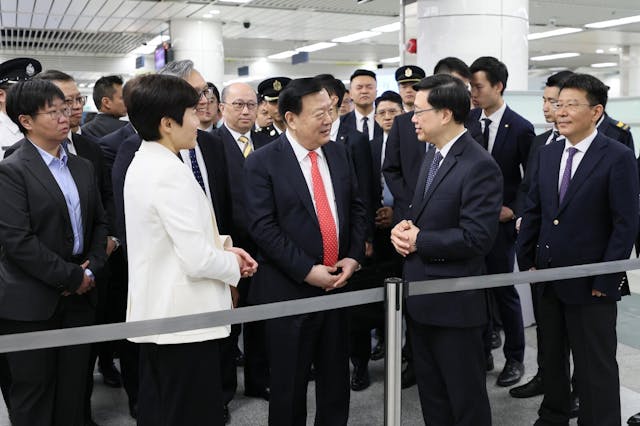
漸進保守主義 得到中央支持
整體而言,陳茂波新一份預算案採取了漸進式改革的傳統預算原則,體現了保守的公共財政理念。然而,這種漸進的保守主義似乎得到了中央的全力支持,特別是港澳事務辦公室主任夏寶龍於2024年2月28日結束了為期7天的訪問。
夏寶龍的訪問具有重要的政治意義。這次訪問旨在落實習近平主席2023年12月在北京值班期間接見香港行政長官李家超的講話精神。習主席先前曾強調香港「由亂到治、由治及興」的重要性。在《基本法》第23條為期一個月的諮詢期即將結束之際,夏爾的訪問似乎達到了多重目的:(一)落實由治及興平穩過渡的精神;(二)聽取市民對《基本法》第23條諮詢文件的意見(與律師及大律師會面);(三)聆聽香港政府如何因應「由治及興」的轉變;(四)在即將舉行的全國人民代表大會會議之前收集公眾意見並向中央領導層報告,其中內地政府的報告必然涉及香港特別行政區的發展。
從夏寶龍到訪的地點來看,中央對香港作為航空樞紐(夏寶龍第一天即到訪香港國際機場)、對香港作為一帶一路區域仲裁中心的高度重視(夏寶龍訪港第二天考察國際調解院籌備辦公室),以及香港作為國際金融中心的高度重視(他會見金融界精英和工商界人士)。
此外,夏寶龍與各區區議會主席、議員、深水埗社區中心的老百姓、青年、愛國社會團體、媒體人士的會面,也體現了中央對香港民生問題和民生問題的高度重視。夏寶龍在陳茂波發表財政預算案演說之前,呼籲香港民眾支持香港政府的政策,是爭取民心的重要舉措。因此,預算內容得到了北京中央的全力支持。
夏寶龍也會見了行政會議成員和立法會議員。他在會面中表達了中央對香港經濟發展和民生問題的關心,為香港的未來注入了信心。從某種意義上說,夏寶龍的訪問代表了對一些外國批評人士猛烈抨擊香港經濟未來的反駁。如果中央全力支持香港,對香港特別行政區的未來充滿信心,那麼,正如夏寶龍所說,香港的愛國精英應該對香港經濟發展和民生改善政策充滿信心。
總的來說,陳茂波新一份《財政預算案》具有傳統的漸進主義預算原則,即任何預算的調整和改革都必然是漸進的、零碎的、一步一腳印的。因此,預算內容符合漸進式改革的宗旨;然而,一些改革內容是邁向累進稅制的一小步,例如淨收入超過500萬港元的較高稅率,以及住宅物業的累進差餉評級制度。如果任何累進稅和評級制度可以被廣泛地視為社會主義,那麼預算案內容是前所未有的。這是一個很好的舉措,符合中央政府的預期,即香港的稅制可以比以往稍微向社會主義制度邁進。從夏寶龍考察各區、會見社會各界人士的方式來看,預算案肯定受到中央的歡迎,希望香港市民支持特區政府的政策措施。畢竟,香港在「由治及興」的重要轉型期,是值得期待、值得要求做得更好的,特別是在經濟和民生兩大領域。
Hong Kong’s budgetary reform and its political implications
The budget speech delivered by Hong Kong’s Financial Secretary Paul Chan has revealed that the Hong Kong government has been retaining its incremental style of reforms in dealing with its financial budget from 2024 to 2025. Most significantly, the budget was announced just a day after the visit of Xia Baolong to Hong Kong for his inspection study. Putting the two events together, the budget has tremendous political significance for the special administrative region.
The entire thrust of the budget is to control government expenditure and to increase government revenue by other means, notably the adjustment of fees and tax items based on the principle of “affordable users pay.” In 2024-2025, the total government revenue is going to be HK$633 billion and the total government expenditure is HK$776.9 billion. The forecast consolidated deficit in 2024-2025 is going to be HK$48.1 billion, with fiscal reserves forecast to be HK$685.1 billion by the end of March 2025. From 2025-2026 to 2028-2029, consolidated surpluses are anticipated, with fiscal reserves estimated at HK$832.2 billion by the end of March 2029.
The forecast consolidated deficit in 2024-2025 is going to be HK$48.1 billion, with fiscal reserves forecast to be HK$685.1 billion by the end of March 2025. From 2025-2026 to 2028-2029, consolidated surpluses are anticipated, with fiscal reserves estimated at HK$832.2 billion by the end of March 2029.
The fiscal consolidation program of the Hong Kong government adopts three principles: (1) the achievement of fiscal balance gradually and the maintenance of fiscal reserves at a prudent level; (2) the focus on expenditure cut, with some revenue increases included pragmatically; and (3) the allocation of resources for the provision and improvement of public services for the sake of taking care of the people’s needs.
In terms of controlling government expenditure, the civil service establishment is maintained at zero growth. The recurrent government expenditure is reduced by one percent in 2026-2027. The operation of the public transport fare concession scheme for the elderly and eligible persons with disabilities, namely HK$2 scheme, and the public transport fare subsidy scheme will be reviewed, but the government has no intention of cancelling these schemes.
For the capital works projects, the principle of cost effectiveness is adopted. They are adjusted in accordance with priorities and urgency. Work projects that are at the mature planning stage, such as the infrastructure works for the Northern Metropolis, are going forward as planned. But work projects that are currently at the preliminary planning stage have their implementation schedule adjusted.
Most importantly, the government proposes a two-tiered standard rates regime for salaries tax and tax under personal assessment, affecting only taxpayers with over HK$5 million net income and whose tax payable is calculated at the standard rate. Taxpayers on progressive rates will not be affected.
The two-tiered standard rates regime means that those people with net income above HK$5 million will have 16 percent tax rates – a very moderate increase. For those people with net income HK$5 million or below, the tax rates remain at 15 percent. Clearly, the reform is slightly progressive but very moderate.
The hotel accommodation tax is going to be three percent starting from January 1, 2025. Moreover, the government introduces a progressive rating system for domestic properties, affecting domestic properties with rateable value of over HK$550,000 only. For an annual rateable value of HK$550,000 or below, the rates percentage charges of five percent remain unchanged, covering 98 percent of the private residential flats. For annual rateable value of HK$550,001 to HK$800,000, the next rates percentage charges will be eight percent, affecting about 1.1 percent of the private residential flats. For annual rateable value above HK$800,000, the rates percentage charges will be 12 percent, affecting 0.8 percent of private residential flats. Overall, the adjustment in the rates percentage charges adopts a slightly progressive system in accordance with the increase in annual rateable value of domestic tenements.
While the government strives to increase its revenue through new measures, it is keen to maintain public confidence in the property market by cancelling the special stamp duty, buyers’ stamp duty and the new residential stamp duty for residential properties with immediate effect. This move has also made concessions to those groups lobbying the government for the cancellation of all these duties so that the property market can and will hopefully remain prosperous.
In the short run, the cancellation of various stamp duties will likely have a stimulating effect on the property market, where property buyers, including mainlanders, may be incentivized to buy properties; however, some observers have predicted that the property market would likely be hard-pressed to cool down and even drop, especially as the global and regional economy is far less optimistic than the predictions made by those with vested interests.
Overall, Paul Chan’s budget adopts the traditional budgetary principle of incremental reforms, demonstrating a conservative philosophy of public finance. Yet, this incremental conservatism has appeared to get the full support of the central authorities, especially as Xia Baolong, the director of the Hong Kong Macau Affairs Office, ended his 7-day visit on February 28, 2024.
Xia’s visit was politically important. His visit aimed at implementing the spirit of the speech delivered by President Xi Jinping in December 2023, when he met Hong Kong Chief Executive John Lee during the duty visit and report to Beijing. The President had previously emphasized the importance of Hong Kong changing “from chaos to governance, and from governance to prosperity.” Coming to Hong Kong toward the end of a one-month consultation period of Article 23 of the Basic Law, Xia’s visit appeared to achieve multiple objectives: (1) to implement the spirit of ensuring a smooth transition from governance to prosperity; (2) to listen to public views on the consultative document on Article 23 of the Basic Law (his meetings with lawyers and barristers); (3) to listen to the Hong Kong government on how it deals with the transition from “governance to prosperity;” and (4) to gather public views and to report to the central leadership prior to the forthcoming National People’s Congress meeting, where the mainland government’s report must touch on the development of the Hong Kong Special Administrative Region (HKSAR).
Judging from the places of visits by Xia Baolong, the central government attaches great importance to Hong Kong as an aviation hub (the first day of Xia’s visit to the international airport), an arbitration center for the Belt and Road scheme (his second day visit to the preparatory office of the international mediation center), and an international monetary and financial center (his meeting with the elites of the monetary and financial industries and with the businesspeople.
Furthermore, Xia’s meetings with the chairpersons and members of District Councils, the ordinary people in Shum Shui Po community center, the youth, the patriotic social groups and the media professionals showed that the central authorities attach immense importance to the livelihood issues and aspects of Hong Kong. Xia’s appeal to the people of Hong Kong to support the policies of the Hong Kong government was an important move that attempts to win the hearts and minds of the public, galvanizing their support just prior to the delivery of Paul Chan’s budget speech. As such, the budget content has acquired the full support of the central authorities in Beijing.
Xia also met the members of the Executive and Legislative Councils. During the meetings, he expressed the central government’s concern about Hong Kong’s economic development and livelihood issues, injecting his confidence over the future of Hong Kong. In a sense, Xia’s visit represented a rebuttal to some foreign critics who had lashed out at Hong Kong’s economic future. If the central authorities fully back up Hong Kong and have confidence in the HKSAR’s future, the ruling elites in Hong Kong, as Xia said, should feel confident in their policies toward the city’s economic development and livelihood improvement.
In conclusion, Paul Chan’s budget has been characterized by the traditional budgetary principle of incrementalism, meaning that any adjustment and reforms made to the budget are bound to be incremental, gradual and piecemeal. As such, the budget content is in line with the tenet of incremental changes; however, some reform elements are a small step toward a progressive tax regime, such as the higher tax rate for those net income exceeding HK$5 million and the progressive rating system for domestic properties. If any progressive tax and rating system can be seen as, broadly speaking, “socialist,” then the budget content is unprecedented. It is a good move in line with what the central authorities expect, namely Hong Kong’s tax regime can move slightly toward a more “socialist” system than ever before. Judging from the way in which Xia Baolong visited various places and met the people from a wide spectrum of the society, the budget is surely welcome by the central authorities, who expect the people of Hong Kong to support the local government’s policies and measures. After all, Hong Kong is expected and required to do a better job in its important transition period “from governance to prosperity,” especially in the twin areas of economy and the people’s livelihood.
原刊於澳門新聞通訊社(MNA)網站,本社獲作者授權轉載。原文網址:https://tinyurl.com/yrj8c9pj



